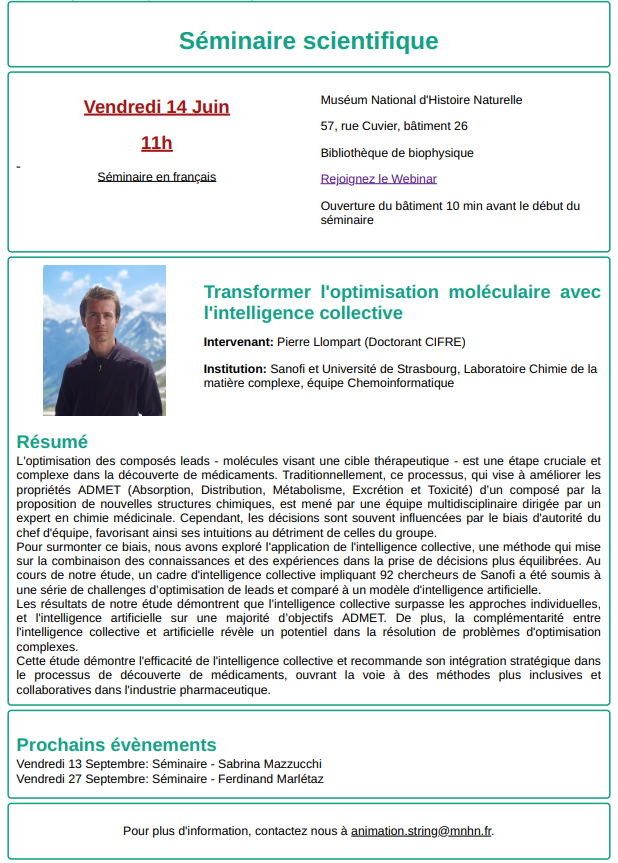PROCHAIN SÉMINAIRE EXTERNE
SÉMINAIRES EXTERNES PASSÉS
_____________________________________________________________________________________
_____________________________________________________________________________________
Vendredi 26 avril à 15h00 en Bibliothèque de Biophysique.
Dr. Thierry Tran
Le rôle clé des interactions microbiennes dans la production de kombucha
UMR Procédés Alimentaires et Microbiologie (Université de Bourgogne, L’Institut Agro, INRAE) / SAS Biomère / EI Transverse Consulting
Tout comme le kéfir, la boisson kombucha autrefois fermentée sur des tables de cuisine, émerge depuis quelques dizaines d’années en tant qu’aliment étiqueté « santé ». Cette boisson acidulée, pétillante et souvent aromatisée est de nos jours vendue prête à boire et produite de manière industrielle au moyen de procédés non-standardisés. Cela a pour conséquence une diversité importante de profils sensoriels, également due à un manque de maîtrise du procédé fermentaire dont la répétabilité varie dans le temps. La nature complexe et évolutive des communautés microbiennes responsables de la fermentation est soupçonnée d’être à l’origine de cette instabilité.
C’est avec la volonté de poser des bases scientifiques de la production de kombucha que nous nous sommes concentrés sur l’investigation des interactions microbiennes, soupçonnées de jouer un rôle clé dans transformations biochimiques et donc sur les caractéristiques sensorielles du produit. Les outils analytiques incluent principalement des analyses microbiologiques culture-dépendantes et de biologie moléculaire mises en relation avec un éventail de techniques de chimie analytique ainsi que de l’analyse sensorielle descriptive. Nous verrons ainsi comment cette recherche en sciences des aliments s’est peu à peu teintée d’écologie microbienne, en mettant en évidence le lien entre la fonctionnalité technologique des levures et bactéries et leur rôle écologique au sein de leur communauté.
Ces travaux proposent ainsi d’aborder la production des aliments fermentés traditionnels non plus comme des systèmes, mais bien des écosystèmes façonnant de par les contraintes exercées, les interactions entre micro-organismes.
_____________________________________________________________________________________
Vendredi 1er Mars à 15h00 en Bibliothèque de Biophysique.
Leo Zeitler
Leo is currently a post-doc at Institut Pasteur. His seminar will present both his career and research work, in the aim of giving insights to young researchers. The talk will be divided into three parts as follows:
1. Leo’s doctorate research : Computational and Mathematical Modelling of DNA Repair in Budding Yeast
Protein-DNA molecular interactions regulate cell behavior in its environment, vital for genome integrity. DNA repair dysfunction is linked to serious diseases. Despite intensive studies, in vivo DNA repair orchestration at the genome scale is poorly understood. Our computational tools use high-throughput sequencing for locus-specific DNA repair kinetics post-UV irradiation. Our minimal model interprets sparse NGS data, revealing continuous repair dynamics over time. Unlike averaging signals, we consider them as stochastic DNA-protein interactions in independent cells, analyzing repair in the context of nuclear processes. To bridge temporal dynamics and population-scale behavior, we developed two approaches—average « mean-field » and cell-specific stochastic methods. These models, based on general DNA-protein interactions, offer insights into gene-specific repair kinetics and damage recognition mechanisms along coding regions, applicable to various nuclear processes.
2. Career transition, postdoc, challenges
3. Current research at Institut Pasteur
In mammals, the uterus undergoes cyclic changes, during which the uterine cell wall and mucosa (endometrium) is built up and–if no fertilization occurs–is broken down. A few species, such as humans and closely related apes, shed the uterine lining if no fertilised egg cell is embedded, which is known as menstruation. Evolutionary studies revealed that whilst most mammals do not shed the endometrium, menstruation as a phenotype developed recently and independently in at least four lineages. Despite the clear evidence of an evolutionary advantage, there is still no consensus for what makes menstruation beneficial for those species. Understanding the reason behind endometrial shedding is of paramount importance to better understand gynaecological disorders and to focus treatment development. In this project, we apply comparative functional genomics to endometrial single-nucleus sequencing data for gene expression (snRNA-seq) and regulation (snATAC-seq) of menstruating and non-menstruating species to identify key differences that give rise to menstruation. The data reveals that the global transcriptome of menstruating species substantially changes between different points during the uterine cycle.
_____________________________________________________________________________________




